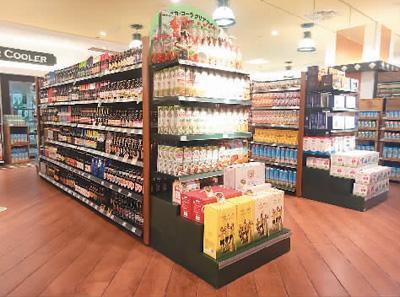


Imported wines and beverages are placed on the shelves of the high-end luxury shopping mall Beijing SKP. (Photo: Wang Junling/People’s Daily Overseas Edition)
More imported goods entered the Chinese market both online and offline in the year following the first China International Import Expo (CIIE), which took place last November in Shanghai.
As the second CIIE approaches, imported goods will become increasingly popular in day-to-day life, and foreign merchants will share the benefits brought by the transformation and upgrading of the Chinese market.
Beside first-tier cities, imports have spread to stores in middle-sized and small cities such as the northeast border city Changchun.
Various brands from Japan, South Korea and Russia are sold in the Changchun Xinglong comprehensive bonded area. Every weekend, a stream of people can be seen carrying bulging bags out of the product display area.
A person in charge introduced that the bonded area is far from the downtown area, but many customers choose to drive to the Xinglong comprehensive bonded area each week.
Ms. Wang drove half an hour to the mall. She told People’s Daily Overseas Edition that the imported goods sold in the bonded area feature a wide variety and lower prices, and customers don’t need to worry about the authenticity of products.
“In recent years, I can see more imported goods around, especially food produced in Southeast Asia,” said Guangdong-based engineer Ren Wei.
“I prefer buying imported durable goods and cosmetics,” Ren said.
In the last 10 years, China’s imports of food increased by an average of 17.4 percent annually, first hitting $70 billion in 2018, according to the official data from the General Administration of Customs.
China has granted market access for 2,283 types of food from 176 countries and regions. A total of 18,295 overseas food producers have been registered in China, and 33,059 import and export agents have been filed at customs.
Experts noted that expanding imports is part of China’s foreign trade policy and a key point of China’s opening-up policy. It’s of significance for both China’s economy and global economic development.
China has lowered its average tariff rate to 7.5 percent, almost the same level as various developed countries, said vice commerce minister Qian Keming, in reference to China’s outcomes of opening up.
In the future, China will continue to promote investment liberalization, and introduce a new 2019 negative list for foreign investment in free trade zones and other areas in China, said Qian.
 Fire brigade in Shanghai holds group wedding
Fire brigade in Shanghai holds group wedding Tourists enjoy ice sculptures in Datan Town, north China
Tourists enjoy ice sculptures in Datan Town, north China Sunset scenery of Dayan Pagoda in Xi'an
Sunset scenery of Dayan Pagoda in Xi'an Tourists have fun at scenic spot in Nanlong Town, NW China
Tourists have fun at scenic spot in Nanlong Town, NW China Harbin attracts tourists by making best use of ice in winter
Harbin attracts tourists by making best use of ice in winter In pics: FIS Alpine Ski Women's World Cup Slalom
In pics: FIS Alpine Ski Women's World Cup Slalom Black-necked cranes rest at reservoir in Lhunzhub County, Lhasa
Black-necked cranes rest at reservoir in Lhunzhub County, Lhasa China's FAST telescope will be available to foreign scientists in April
China's FAST telescope will be available to foreign scientists in April "She power" plays indispensable role in poverty alleviation
"She power" plays indispensable role in poverty alleviation Top 10 world news events of People's Daily in 2020
Top 10 world news events of People's Daily in 2020 Top 10 China news events of People's Daily in 2020
Top 10 China news events of People's Daily in 2020 Top 10 media buzzwords of 2020
Top 10 media buzzwords of 2020 Year-ender:10 major tourism stories of 2020
Year-ender:10 major tourism stories of 2020 No interference in Venezuelan issues
No interference in Venezuelan issues
 Biz prepares for trade spat
Biz prepares for trade spat
 Broadcasting Continent
Broadcasting Continent Australia wins Chinese CEOs as US loses
Australia wins Chinese CEOs as US loses